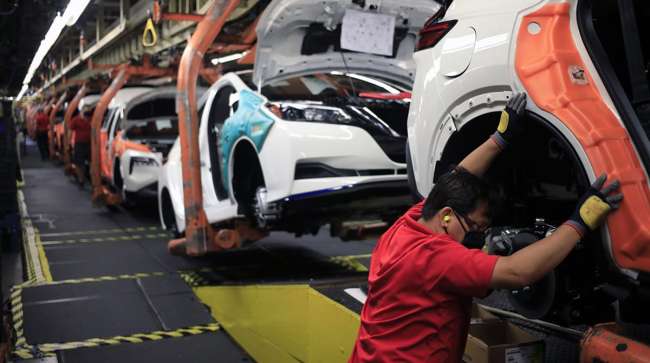A worker installs parts on a vehicle on the assembly line at the Nissan Motor Co. manufacturing facility in Smyrna, Tenn. (Luke Sharrett/Bloomberg News)
Nissan Motor Co. decided to stop selling a pair of Mexican-built Infiniti SUVs in the U.S. market, in response to President Donald Trump’s sweeping tariffs on car imports.
New orders for the QX50 and QX55 variants manufactured in Mexico will be paused, the Yokohama-based company said in a statement April 4. It also decided to maintain production of the Rogue model at its plant in Smyrna, Tenn., partially reversing a previously announced plan to cut output as part of a broad effort to restructure the flailing business.
Within hours of taking effect, Trump’s 25% tariffs on imported cars this week forced many brands to halt plants or offer steep discounts to placate customers.
“We are reviewing our production and supply chain operations to identify optimal solutions for efficiency and sustainability,” Nissan said. “The company currently has ample inventory at our U.S. retailers that is unaffected by the new tariffs.”
In January, the Japanese carmaker said it was going to cut jobs and output at its plants in Smyrna, Tenn., and Canton, Miss., by eliminating one work shift at each location in mid-April. More than half of Nissan’s U.S. sales are sourced from those two plants, according to the company.
The full picture of Nissan’s crisis — its worst in some 26 years — became clear in November, after a 94% drop in first-half net income prompted plans to cut 9,000 jobs and slash production capacity by a fifth.
Things only worsened after its tie-up with Honda Motor Co., a historic deal that on paper would’ve created one of the world’s largest automakers, was officially terminated in February.
Then its CEO was replaced earlier this month, after Makoto Uchida passed the baton to Ivan Espinosa, 46, a Mexican native who previously oversaw the company’s product portfolio.






